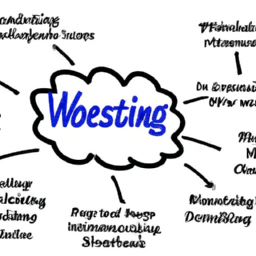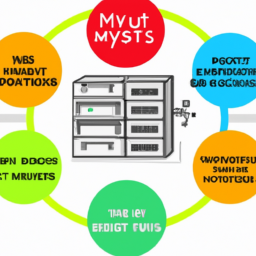What You Need to Know About Web Hosting - A Detailed Guide
Web hosting is particularly an unfamiliar term for non-technical people who don’t know much about web development. It is an integral component behind the working of the internet, which has often been overlooked. From YouTube videos to news articles or social media, whatever you browse on the web resides on one or more servers. These servers are both managed and maintained by a company or an individual who ensures you can access this digital content.
But it isn’t that straightforward; there are many complexities when it comes to web hosting. In this blog, we’ll discuss the dynamic world of web hosting, exploring its types, purpose, and functionality.
What is Web Hosting?

Consider hotels in popular tourist spots, providing people with different types of rooms to reserve for a few days. So, instead of buying an apartment or a house temporarily, tourists can make that room their home for the entire period of their vacation. Similar to the hotel offering guests a temporary place to stay, a web hosting server allows online visitors to access your website.
Web hosting is a service that website developers or businesses need to make their sites accessible on the internet. Web hosts provide infrastructure and technology, i.e., servers for your websites. These servers are high-end, powerful computers designed to handle requests from internet browsers. You can even check your website on the web by just searching the domain name provided by the web host.
Why Should You Get Web Hosting?
If you want to have a fully functional website for your business, it isn’t possible without a reliable web hosting service. Following are a few reasons why you should get web hosting:
Affordable Online Presence: To establish a digital presence, you must transfer your locally stored website files to a web server. Web hosting companies offer a cost-effective solution where you pay a fixed price for their services, sparing you the expenses and hassle of server maintenance.
Enhanced Performance: Web hosting providers prioritize performance. They often bundle in additional features and tools to optimize your website’s speed and responsiveness. For instance, features like Content Delivery Network (CDN) integration can significantly reduce latency, ensuring a smooth user experience.
User-Friendly Control: Most hosting services provide a user-friendly control panel, simplifying the configuration of your website and hosting account. This ease of use allows even those with minimal technical expertise to manage their online presence effectively.
Reliable Support: Most web hosting companies provide 24/7 customer support. So, whether you want to connect through email, chat assistance, call, or through messaging, their representative will be at your service to guide you. It guarantees that you get professional help whenever any problem arises or you have any query about your website hosting.
Time-Saving: Entrusting a hosting provider with technical aspects like server maintenance and security monitoring frees up your time. You can devote more energy to developing and enhancing your website, knowing that the hosting is in capable hands.
What are the Different Types of Web Hosting?

Before you get down to choose a web hosting service, it is important to know which type you need for your website. There are different web hosting services for different types of websites, listed as follows:
1. Shared Hosting
Just like its name, shared hosting involves multiple websites sharing resources on a single server. This hosting is generally for beginners who don’t care about advanced specifications or high bandwidth.
- Pros: Cost-effective, easy to set up, and managed.
- Cons: Limited resources, slower performance during high traffic, less control.
APPLICATIONS: Personal blogs, small business websites, and startups with low traffic and budget constraints.
2. Virtual Private Server (VPS) Hosting
Similar to shared hosting, VPS hosting also shares the server with different websites, but it holds a virtual partition. It divides a physical server into virtual servers, providing each website with dedicated resources and making it more secluded.
- Pros: dedicated server space, better performance, scalability, and root access.
- Cons: Costs more than shared hosting requires some technical knowledge for management.
APPLICATIONS: Growing businesses, e-commerce sites, and websites that need more control and resources.
3. Dedicated Hosting
Dedicated hosting offers an entire server designated to a single website or client. It allows complete customization of your hosting environment, choosing server configuration and operating system, perfect for complex apps.
- Pros: Maximum performance, control, and security.
- Cons: Expensive, requires technical expertise for management.
APPLICATIONS: Large e-commerce websites, enterprise-level applications, and high-traffic websites.
4. Cloud Hosting
Cloud hosting utilizes a network of virtual servers, often spread across various data centers. This makes your website dynamic, so whenever any server is down, other servers can take over to maintain the uptime.
- Pros: Reliable, scalable, and mostly comes with a pay-as-you-go price.
- Cons: Need technical knowledge to set up
APPLICATIONS: Websites with fluctuating traffic, SaaS applications, and businesses that need flexibility and reliability.
5 Important Factors to Consider When Choosing Web Hosting

Choosing a web hosting service isn’t as simple as you might think, as it comes with twists and turns. Here’s a list of the factors to consider when getting a web hosting service:
1. Website Needs and Requirements:
Identify the specific requirements of your website. Consider factors like the type of website you’re building, like blog, e-commerce, portfolio, the expected traffic, and whether you plan to use platforms like WordPress. Understanding your needs helps you choose the most suitable hosting type.
2. Server Reliability and Uptime:
A reliable web host ensures your website remains accessible to visitors. Look for providers with high uptime scores, which are ideally 99.95% or better. Downtime can lead to lost revenue and frustrated users.
3. Scalability and Progression:
As your website grows, it may require more resources. Always choose the web hosting service that is flexible with upgrading their hosting plan. It allows your website to handle increased traffic and demands in the future.
4. Cost Transparency:
Pay attention to both the initial signup price and renewal price. Some hosts raise renewal rates significantly. Choose a provider with reasonable price increases to avoid unexpected costs. Review the Terms of Service (ToS) for renewal rate information.
5. Refund Policy and Free Trials:
Hosting can be costly, especially for beginners. Look for hosting companies that offer a refund policy or a free trial period. This allows you to test the service and get a refund if it doesn’t meet your needs. Avoid providers with excessive cancellation fees during trial periods.
What are the Myths Related to Web Hosting? Burst Them Before You Buy One

Web hosting plays a vital role in your online journey, but it’s wrapped in a few misconceptions. Here’s a breakdown of some of the most common myths surrounding web hosting and factual information to help you make informed decisions
Myth 1: All Web Hosting Providers are Equal
The biggest myth related to web hosting is assuming that all web hosting services are alike. Different providers offer different quality of service in terms of support, reliability, and performance. You need to research extensively and go for the one that matches your website requirements.
Myth 2: Any Web Hosting Features Will Do the Work
Believing that any web hosting features will work for you and cannot lead to performance issues is a wrong approach. Different websites require specific features, such as eCommerce capabilities, content management systems (CMS), or scalability. So, keeping your hosting features aligned with your website type is essential for optimal functionality.
Myth 3: Small Businesses Don’t Need to Worry About Website Security
This myth can be harmful to your online presence and website itself. Even small businesses face the risk of cyber threats. Disregarding website security can result in cyber attacks, particularly data breaches, identity theft, etc. Thus, it’s crucial for all web hosting services to prioritize security measures such as SSL certificates and routine updates.
Myth 4: Low-Cost Domain Hosting Indicates Poor Quality Service
A common misconception is that affordable domain hosting equates to low-grade service. While high prices may sometimes reflect better quality, cost doesn’t always correlate with performance. Many budget-friendly hosting options provide reliable services with the features you need.
Myth 5: Transferring a Website to a New Hosting Provider is Complex
Switching web hosting providers is often seen as a daunting task. But the process can be smooth if you plan it right under proper guidance. Most hosting companies even offer migration assistance for easy transfer.
Myth 6: Web Hosting is Costly
Web hosting doesn’t have to break the bank. Various hosting options cater to different budgets. Shared hosting, for instance, is cost-effective and suitable for small websites. It’s essential to evaluate your needs and find a hosting solution that fits your budget.
Summing Up
Selecting the right web hosting for your needs is not just a technical decision; it’s a crucial step toward ensuring your online success. By understanding your website’s requirements, researching providers, and debunking common myths, you empower yourself to make an informed choice. Remember, the perfect hosting solution is the one that aligns seamlessly with your website’s goals, providing the foundation for a reliable, secure, and efficient online presence. So, choose wisely and watch your website thrive.

